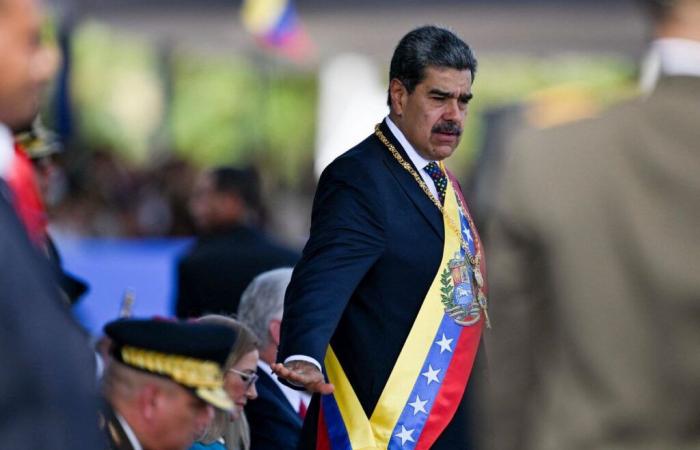Venezuela –
Latin American countries denounce Maduro’s inauguration
Several leaders of Latin American countries denounced on Saturday the contested inauguration of Venezuelan President Nicolas Maduro.
AFP
Published today at 1:28 a.m. Updated 4 minutes ago
Venezuelan President Nicolas Maduro, in Caracas, January 10, 2025.
AFP
Subscribe now and enjoy the audio playback feature.
BotTalk
Several Latin American countries denounced on Saturday the contested swearing-in of Nicolas Maduro for a third term at the head of Venezuela, with Brazil in particular evoking “its great concern” about “violations of the human rights of opponents”.
Proclaimed winner of the July presidential election despite suspicions of massive fraud, Nicolas Maduro, in power since 2013, was inaugurated on Friday for a new six-year term, a ceremony largely shunned by the international community.
Former Colombian President Alvaro Uribe called on Saturday for a military intervention “to drive out” Nicolas Maduro while in Caracas his supporters celebrated his inauguration with a large parade of bikers in the capital Caracas.
“Electoral fraud imposed by state terror”
Ecuador, Panama, Costa Rica and the Dominican Republic, which make up the Alliance for Development in Democracy (ADD), rejected “in the most energetic manner the illegitimate act of investiture […] product of electoral fraud imposed by state terror against the Venezuelan people,” according to a statement.
“Even if we recognize gestures of détente by the Maduro government, such as the release of 1,500 detainees in recent months, the Brazilian government deplores the recent episodes of arrests, threats and persecution of political opponents” Venezuelan, affirmed the Ministry of Brazilian Foreign Affairs in a press release.
The Brazil of left-wing President Luis Inacio Lula da Silva has not officially recognized the victory of the socialist president, demanding that the Venezuelan government publish the minutes of the July election.
“Respect for human rights”
Nicolas Maduro was proclaimed winner of the July 28 presidential election with 52% of the votes by the National Electoral Council (CNE), considered to be under the orders of those in power. The CNE did not make public the minutes of the polling stations, saying it had been the victim of computer hacking, considered not very credible by many observers.
The opposition, which published the minutes provided by its scrutineers, assures that its candidate Edmundo Gonzalez Urrutia obtained more than 67% of the votes.
“Brazil urges Venezuelan political forces to dialogue and to seek a common understanding, based on respect for human rights,” the Lula government underlined in its press release. On Friday, Brazilian President and his French counterpart Emmanuel Macron called on Nicolas Maduro to “resume dialogue with the opposition.”
“An international military intervention”
In Colombia, former right-wing president Alvaro Uribe took part in a sit-down for “freedom” in Cucuta, on the Venezuelan border, saying: “Let this crook know that what we are advocating is an international military intervention with the Venezuelan army to oust the dictatorship […] and immediately call free elections.”
In Caracas, the pro-Maduro camp flaunted in a city center still crisscrossed by a significant security system.
“We are with you Maduro, with you until death,” said a biker, Victor Izarra, to the public channel which broadcast images of the parade in the capital on Saturday.
“You coward”
On social networks, Nicolas Maduro recalled that the army had reaffirmed its support for him. “This new mandate is an opportunity to strengthen peace,” he assured.
He challenged former Colombian President Alvaro Uribe, calling him a “sad paramilitary and drug-trafficking character,” during the closing of an “anti-fascist” festival in Caracas.
“You coward, you come in front of the Alvaro Uribe troops, I will wait for you on the battlefield,” Maduro reacted.
“The government is stronger today”
On Friday, the opposition called the inauguration a “coup d’état” and Edmundo Gonzalez Urrutia asked the army to “disobey illegal orders.”
The opponent, who had considered returning from exile to take the oath in Caracas and take power, finally gave up this plan for fear of being arrested. There is a price of $100,000 on his head.
“I don’t see any way to overthrow him (Maduro) at this time. The government is stronger today than a few years ago,” Rebecca Hanson, a specialist in Latin America at the University of Florida, told AFP.
“It is very unlikely that he will be removed from office”
The government “has not shown major signs of weakness and Maduro’s government has taken measures in recent years to remove – in some cases by imprisoning – those who could have constituted a threat”, underlines- She.
“There are also no credible signs that the military is ready to turn around. This does not mean that Maduro will last another six years, but unless some of these factors change, it is very unlikely that he will be removed from office” in the short term, she believes.
“Latest news”
Want to stay on top of the news? “Tribune de Genève” offers you two meetings per day, directly in your email box. So you don’t miss anything that’s happening in your canton, in Switzerland or around the world.
Other newsletters
Log in
Did you find an error? Please report it to us.
0 comments






